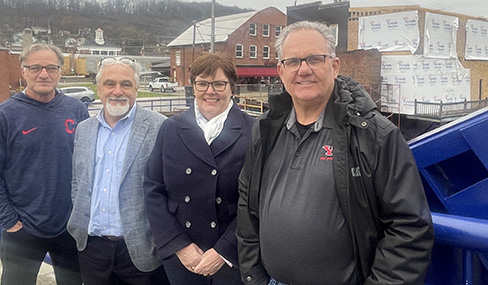LOWELLVILLE, Ohio – As the Mahoning River flows, so flows the potential for millions of investment dollars to riverfront communities, even the smallest of towns along its path.
Nowhere is that more evident than in the village of Lowellville, population 1,129, according to 2021 census data. There, a fresh tranche of private investment is pouring into the tiny business district. Those behind this effort say they are determined to remake and transform the very heart of the community – building by building if necessary.
It would be quite a turnaround.
Earlier this year, there were serious discussions about razing a two-story brick structure constructed in 1912 at 123 Water St. Just months ago, it stood as a reminder of how the aging building stock of the village had fallen into neglect, destined soon for the wrecking ball.
“They were going to tear the building down,” says Matt Estephan, who along with his wife, Jean, has invested tens of thousands of dollars to rehabilitate the century-old structure and another one next door.
The couple, along with other private investors, have helped to kick-start an ambitious revitalization effort in this tight-knit and insulated hamlet.
So, why take the risk on a building that was in such disrepair that it was targeted for demolition?
“Vision,” Estephan replies as he opens the back door of the building and walks to a wooden deck that overlooks the pristine Mahoning River.
By next spring, Estephan plans to have converted this eyesore into three, two-story condominiums that hug the northern bank of the river. Two of the units would be approximately 1,600 square feet, while one would measure 1,800 square feet, he says.
“It’s old. It’s history,” Estephan says. “I can turn it into something beautiful.” In all, he expects the rehab effort to cost at least $500,000.
Estephan is also the owner of Sky Roofing, based in Canfield.

Removal of the Lowellville dam in 2020 has allowed the Mahoning River to return to its free-flowing natural state, a core asset that has since attracted kayakers, canoeists and fishing enthusiasts to the village.
To build on this, the Estephans are also redeveloping the neighboring property at 131-137 E. Water St., a nearly century-old single-story rectangular shaped-structure that they plan to turn into a restaurant and adjoining bourbon and cigar bar.
The building – now nearly completely gutted – once housed several retail establishments, including an Isaly’s Dairy, a laundry, a post office and a barbershop.
“It’s going to be a small restaurant where you can come in and have a burger, sandwich or a small steak,” he says. A downstairs entrance to a deck that overlooks the river is also planned for the site. “It’s somewhere where you can sit over the water and enjoy, have a drink on the deck.”
Another deck that extends toward the river will run parallel to Water Street and connect the new condo complex with the still-unnamed restaurant, Estephan says.
“You have all the kayaking and canoeing starting on the river,” adds Jean Estephan. “So, if you focus on that aspect of family and community, you’re going to get an environment that is appealing to people.”
More and more, patrons are forsaking the big city for small, quaint locations where they can unwind and relax, she says. “A lot of people don’t want to go to the big city.”
Developing the waterfront has long been a goal of village officials and the prospect of new private investment mixed with ongoing public projects here stand to make this a reality.
“Lowellville is a small town, a good town,” Matt Estephan says. “People enjoy the river. By the middle of next year, this will be ready.”
OTHER INVESTORS
The Estephans aren’t the only investors who see promise in this river town.
Over the past 15 months, Ray Carlson, the owner of RC Compounding, has kept busy renovating a former furniture warehouse on East Water Street, directly across from the Estephans’ redevelopment project.

“This building maybe had a year left before it would’ve had to come down,” he says.
Instead, Carlson purchased the structure and has since transformed the space into a private events center with a stage that could host music recitals, bands, comedians, corporate gatherings and political events such as candidate debates.
“I’ve done most of the work myself,” he says.
The heart of the new center – now named Carlson’s – is a $100,000 sound and video system that he boasts is second-to-none in the Mahoning Valley. Local bands, for example, would be able to record their live performances at the center or even create professional recordings and videos.
“Everything we’ve done in this building has sound in mind,” Carlson says, from the choice of wood – all black walnut and cherry – to the insulation.
Currently, he is putting the finishing touches on a back bar area, replete with a splashy mural that evokes the steel heritage of the Mahoning Valley.
To date, Carlson says he’s invested approximately $350,000 in the project. The business plan, he acknowledges, remains a work in progress.
“The first priority was to save the building,” he says.
It’s not Carlson’s first investment in Lowellville.
In 2015, he opted to purchase and renovate the former Huntington Bank building at the corner of East Water and First streets and convert it into administrative offices for his business, RC Compounding, a pharmaceutical compounding lab in Poland.
Since then, Carlson has also rehabilitated two other buildings in the village and converted them into short-term rental apartment units.
Among these is Carlson’s Swing Shoppe on Liberty Street, an early 1900s building that today contains a golf simulator in the basement and a billiards table on the first floor.
Another major investment was the purchase and renovation of Carchedi’s, a restaurant that’s been a staple in Lowellville for 60 years. When the owners planned to close the restaurant in 2018 after 55 years in business, Carlson bought the building and spent nine months remodeling the establishment before reopening.
“I’ve probably invested between $1 million and $1.5 million in the village,” he estimates.
PUBLIC DEVELOPMENT
This resurgence of private investment in Lowellville comes in the wake of millions of dollars in public money that began with the $2.3 million dam removal, says Mayor James Iudiciani.
“We’ve seen about $5 million of investment since all of this started,” he says, explaining it’s from a combination of state grants and local matching funds.
Two years ago, the village completed a canoe and kayak launch on the northern side of the river, just west of the commercial district now under development, Iudiciani said.
A new pavilion is now under construction at the site – the first phase of what Iudiciani projects will be a larger riverfront park that spans 13 acres along the Mahoning.
To date, more than $2.9 million has been spent to develop Riverfront Park, while another $746,702 was invested in the Stavich Bike Trail.
The village, along with development partner Eastgate Regional Council of Governments, is seeking additional funding through the Appalachian Regional Commission to complete these projects.
The hope is that these public investments tied to the river will spur even more private development.
So far, it’s moving according to plan, Iudiciani says.
“We want to make this a walkable, livable, community,” he says.
Several years ago, the mayor and other partners bought The Station Grill at Melillo’s, a popular village restaurant. Other potential projects in Lowellville include a new bakery and coffee shop and the possibility of additional condominiums on the eastern end of Water Street.
“Private investment has helped revitalize this whole town and it all started with the river,” the mayor says. “If we didn’t have people investing in this town, we wouldn’t have any of this.”
Pictured at top: Matt Estephan stands on a deck of a century-old building that he is converting into waterfront condos.
